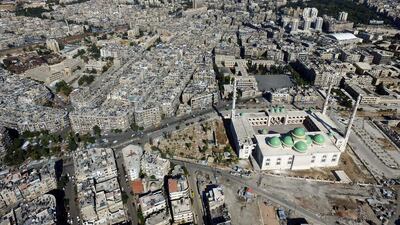TYRE, LEBANON // Russia on Friday announced a second 24-hour extension to a unilateral ceasefire in eastern Aleppo and blamed extremist rebels for preventing the safe evacuation of the ill and wounded.
Moscow announced an extension of the “humanitarian pause” in eastern Aleppo until 1600 GMT (7pm UAE time) on Saturday, at the request of the UN and other international organisations to allow civilians and militants to leave the besieged city, where food is running low. But the United Nations was forced to cancel a four-day evacuation plan because of a lack of security.
Senior military official Sergei Rudskoi said extremists were “doing everything” to prevent safe departures and using the ceasefire to regroup.
“We are seeing them massing around Aleppo and preparing for another breakthrough into the city’s eastern neighbourhoods,” he said. They numbered more than 1,200 including more than 30 suicide bombers, he added. Eight injured fighters from the Islamist group Ahrar Al Sham had left the city with seven civilians via the humanitarian corridors on the first day of the pause in hostilities, he said.
But a contributor to The National based in eastern Aleppo said that civilians trying to cross into government territory on Friday were turned back by sniper fire. Fighters from the rebel Free Syrian Army continued advising civilians not to try to cross the line, as it was too dangerous.
While many of the estimated 275,000 civilians trapped in eastern Aleppo are eager to leave after living under a total siege for more than a month, they are still waiting for a safe way to do so.
The head of the UN’s humanitarian task force for Syria, Jan Egeland, said on Thursday that the agency was confident of securing “green lights” from the Syrian government, Russia and rebel groups to go ahead with medical evacuations. Jens Laerke, spokesman for the United Nations humanitarian office Ocha described the evacuations as “an astronomically difficult operation whereby we need the security assurances from all sides to be there and to be adhered to, plus the facilitation from all parties”.
The plan involved two days of evacuations to west Aleppo, rebel-held Idlib or Turkey, followed by two days of delivering aid to eastern Aleppo and more evacuations. But as the violence continued on Friday Mr Laerke was forced to admit they were not happening.
Russia and Syria have blamed the rebels for obstructing the objectives of the ceasefire. Russian foreign minister Sergey Lavrov told US secretary of state John Kerry on Thursday that rebels were violating the truce and “preventing the evacuation of the population”.
Syria’s representative to the UN Bashar Al Jaafari on Friday accused “terrorist organisations” – primarily the former Al Qaeda affiliate Jabhat Fatah Al Sham and the Islamist Ahrar Al Sham – of attacking the humanitarian corridors and hindering the passage of civilians and fighters out of eastern Aleppo.
However, the continued failure of the truce has only stoked further international criticism of Russia and the Syrian government.
UN human rights chief Zeid Ra’ad Al Hussein lashed out against rebel shelling of civilian neighbourhoods of western Aleppo and indiscriminate air strikes by Russian and Syrian government forces in eastern Aleppo. However, the “overwhelming majority” of civilian casualties were being caused by the regime and Russia, he said.
“These violations constitute war crimes,” he said. “And if knowingly committed as part of a widespread or systematic attack directed against civilians, they constitute crimes against humanity.”
The situation in northern Syria became even more complicated late on Thursday with the Damascus vowing to shoot down any Turkish warplanes in Syria’s airspace. The threat came after Turkey claimed to have killed between 160 and 200 Kurdish YPG fighters north of Aleppo, though the UK-based Syrian Observatory for Human Rights put the number much lower and the Syrian government referred to “150 innocent civilians” dying in the Turkish strikes.
Turkey entered Syria’s war in late August, backing Syrian rebel groups against ISIL and Kurdish YPG forces near its borders. While the YPG has clashed with Syrian government forces and its leaders regularly speak out against the government, the US-allied Kurdish group now finds itself standing between Turkey-backed rebels and Syrian government troops enforcing the siege of eastern Aleppo. While the Turkish-backed rebel forces in the area have so far limited their actions to battling the YPG and ISIL, they have recently shown a desire to help their comrades in Aleppo.
jwood@thenational.ae
* With additional reporting by Zouhir Al Shimale in Aleppo, Reuters and Agence France-Presse

